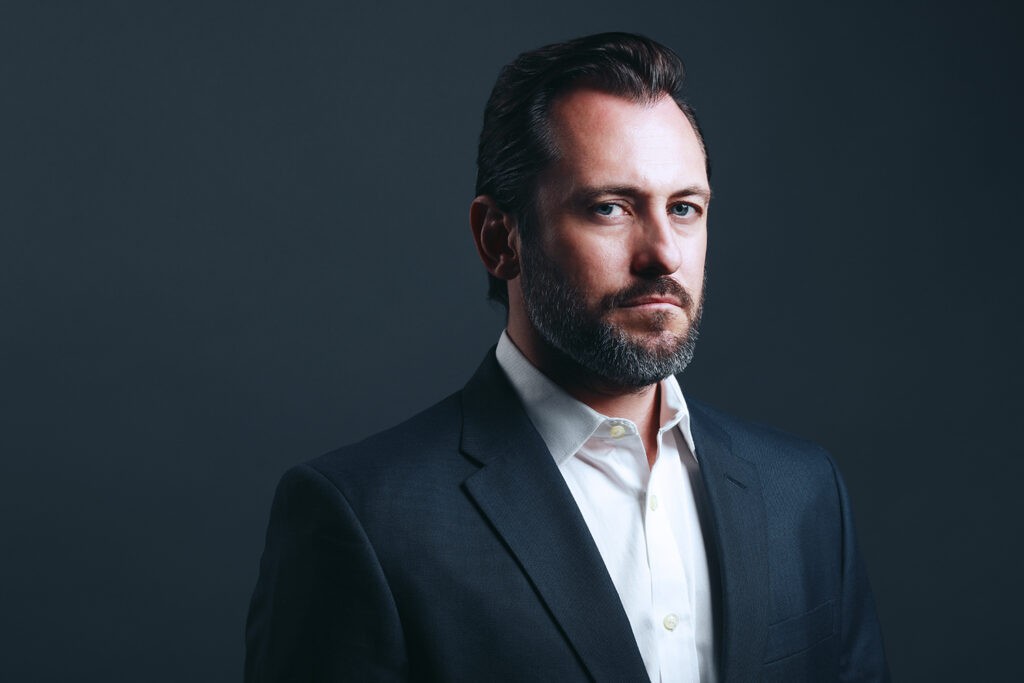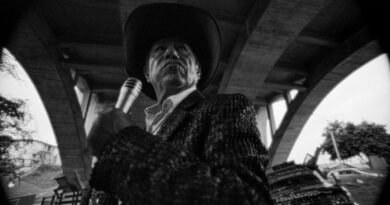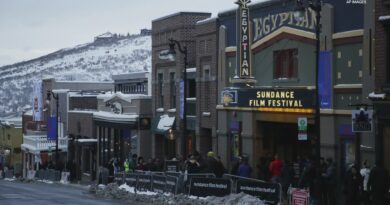LUMINARY: Q&A with Actor, Writer and Director Phil Donlon
Chicago native Phil Donlon is enjoying a bit of a homecoming this fall. The actor, writer and director will be front-and-center when his latest starring role comes to Gene Siskel Film Center this September. In the gritty drama, High & Outside, Donlon stars as Phil Harding, a down-and-out baseball player who once enjoyed a promising rise on the way to the Major Leagues. Harding has had his knocks and recklessly tries to keep his dream of the big leagues alive while scratching to get out from under the thumb of his domineering baseball legend father, Len. Broke and mere steps away from divorce, Harding has just been released from the last team he thought might give him a shot.
High & Outside: A Baseball Film Noir, which explores just how far one man will go to keep his dream alive and the dangers of living within the shadow of someone else, will receive its Chicago premiere when it’s screened this fall at the Gene Siskel Film Center in Downtown Chicago.
The film also stars legendary actors Ernie Hudson and Geoffrey Lewis (in his final role), and the upcoming screening will mark a poignant milestone for Donlon and the film’s producers for a variety of reasons. Immersing himself in the role, Donlon got a chance to meet legendary all-star Roger Clemens in a professional training camp, and he signed a one-day contract with the minor league Souix City Explorers-—footage of the day appears in the film.
The film’s success has been a slow brew, but it is working its way up to be a strong one. It was tapped for Best Film and Best Screenplay nominations at the Raindance Festival and for a Best Narrative Feature nomination at the Austin Film Festival.
I had the opportunity to sit down with the actor as he sets the stage to showcase this passion project here, and I can tell you, his enthusiasm for the film and its message is definitely contagious.
How did you first become involved with High & Outside?
I was doing Sam Sheppard’s play, Fool For Love, in LA. opposite Geoffrey Lewis. Evald Johnson (director of High & Outside) came and saw the show. Later that night at the after party, Geoff and his wife, Evald and I were all standing together, and Geoff’s wife pointed at Geoff and I (sic) and said “You two should play father and son in a film, you have the same eyes.” Evald sort of archived that information…many months later he called me and said he had an idea for us. And so began the film.
What was it like to have the film nominated and shown at the prestigious Raindance Film Festival in London?
It was not the first festival we thought we’d play at, but we all were deeply honored and flattered Elliot Grove loved our film so much. The reason we didn’t think of Raindance as our first fest…we assumed since baseball is such an American sport…that it would surely play a festival in the US first.
And most of the London audience did not know the game of baseball, but fell in love with the movie. The critics also really got the film, the reviews were better than we could have written. For me, playing Raindance taught me a lot about the kind of film we have. It’s not a baseball movie, per say. It’s a father/son film, sins of the father type themes. And to be nominated for Best Film and Screenplay was the cherry on top.
What did that achievement mean for the film?
Raindance taking a chance on the film, nominating it, really set us on course to play the festivals that followed. London gave us the attention we were hoping for. And other festivals caught wind of us, and invited us to play. Austin (Film Festival) was after London, and we were again nominated. Then Cinequest (Film Festival).
Was training camp and hanging out with Roger Clemens, no less, as fun as it sounds?
It was a childhood dream come true. Not only hanging out with Roger and his son…but taking batting practice off of him as well. Roger was very open with me…really wanted to help me understand the “baseball life.”
What did you learn about your character that wasn’t in the script after having had that experience?
Per Roger’s help, what I learned, was most baseball life happens off the field. And that is what the film captures in a very real way. I really got to understand the culture, because it is that..it’s unto itself…different than any other sport…the kind of life these guys lead all season, and then, of course, when they go home when the season is over.
I imagine there was a wealth of depth and dimension your character gained after your 1-day as a contract player with the Sioux City Explorers. Did it offer a greater opportunity for you to go deeper into the dark nature of the film’s context?
Yes, it did. I went in a week early, and spent time suiting up with the players, on the bench, training, hanging out with the guys. Listening to them, watching…lot’s of listening. The words they used, what they talked about, hearing a lot about their struggles… and these young guys struggle. It’s not an easy life. And it is dark.
Were there any serendipitous benefits you can speak to?
I’d have to say meeting all of my childhood baseball heroes. Getting to play in a professional game. All the things I dreamed of when I was 10 years old.
What will it mean for you to bring the film home, in a way, to Chicago’s Gene Siskel Theatre this fall?
A total honor. I grew up watching Siskel and Ebert. In many ways, they both taught me how to watch film. When I was in college, I would look up old reviews of theirs…re-watch movies after reading their reviews…it was like a mini film school for me. To have this film play under the Siskel name, is a personal dream for me.
The film’s success is, I’m sure, bittersweet for all involved given the passing of Geoffrey Lewis. Do you view his performance in a different light now when you see it knowing it was to be his last, given the great platform the project is now enjoying?
Yes, and thank you for bringing that up. I’d first like to give credit to the director, Evald Johnson, for telling the story of an old man coming to grips with his own mortality. There are not a lot of filmmakers willing to tackle that subject matter, mainly because it’s not a popular one…but important. Also, Hollywood has a way of putting its older actors out to pasture. Geoff wanted to keep working, and Evald loved him as an actor. And, yes, it is bittersweet, because what we did not know while we were shooting, what Geoff didn’t share with us, was he was dying. So, it’s a brave performance he gives us. It’s very, very vulnerable. Very raw. Unlike one he ever did. When we wrapped shooting, he did see a few clips of the film..he yelled “Oscar!”…Geoff wanted to keep working.
Tell me the truth, how competitive did you get out there on the diamond?
(Laughing) Very. In the storyline to the film my character strikes out and gets released. When I played in the game I kept making contact with the ball when I was up at the plate…I even hit one opposite field off the wall… the director yelled “Stopping hitting it.” So… yes, I was.
What’s next for the film?
The Siskel starts our multi-city theatrical run before it hits (video on demand). So I think the producers plan a New York City and Los Angeles run as well.
The Gene Siskel Film Center will screen High & Outside: A Baseball Noir on September 7, 8 and 12, 2018.




